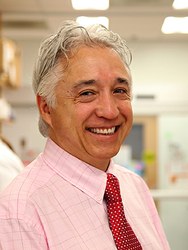PhD
Professor
UNC-Chapel Hill
Virology
Area of interest
Throughout evolution, humans have been challenged by viral pathogens new to the species. For the most part, our immune system mounts an adequate response that protects us from the fatal consequences of infection. However, in some instances viruses can circumvent the immune system and cause fatal diseases such as cancer (EBV, KSHV, HCV), hemorrhagic fever (Ebola virus) and AIDS (HIV). Understanding the host pathogen relationship at a molecular level provides rational approaches to therapy and vaccine development. In addition, it also provides a better understanding of human biology. We are interested in how human viruses cause human cancer, how HIV causes AIDS and why the immune system is not able to control viral infections. Our working hypothesis is that specific viral genes are the key determinants of viral pathogenesis and are responsible for disease progression. To evaluate the role of these genes in disease progression, we have developed in vitro and in vivo models that recapitulate specific aspects of viral infection. Our emphasis has been placed on humanized mice as models where human specific pathogens can be studied and where novel therapeutic interventions can be evaluated. For example, lymphotropic viruses are responsible for a vast number of human cancers. Unfortunately, their study has been severely limited due to fact that the majority of these viruses do not infect other mammals. Thus the lack of animal models susceptible to infection by these human viruses has severely limited our ability to develop novel treatments and effective vaccines. Our laboratory has established novel animal models that recapitulate key aspect of infection by human-specific viruses such as EBV, HIV, HHV-8 and dengue virus. We are currently using these systems to evaluate novel interventions to treat and/or prevent the devastating diseases caused by these agents.

